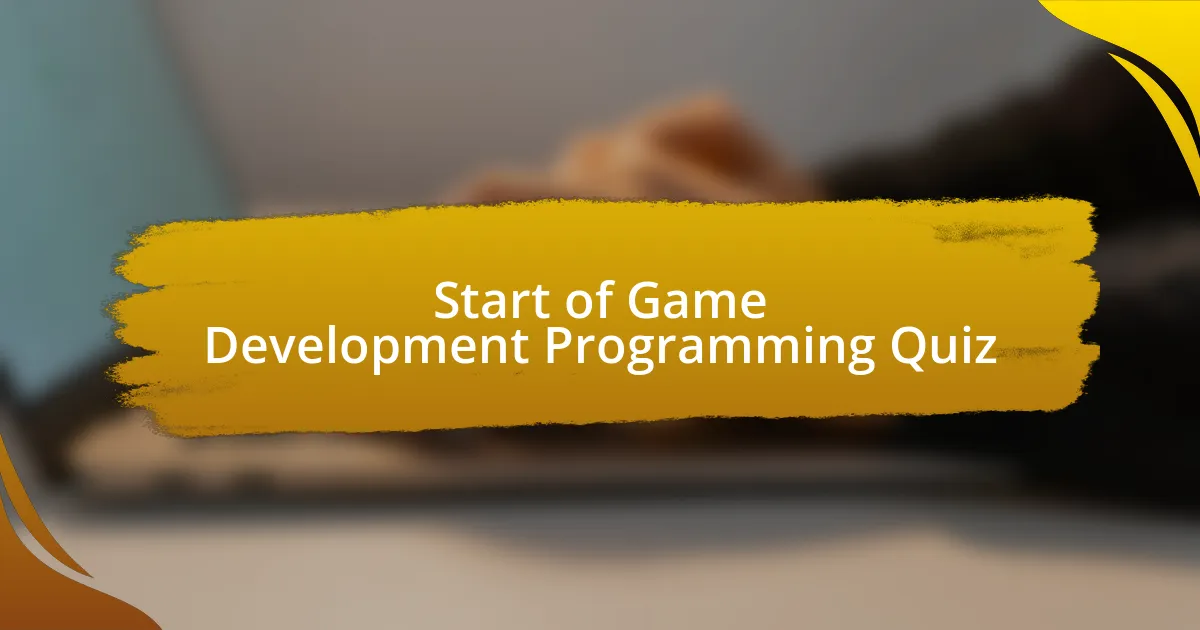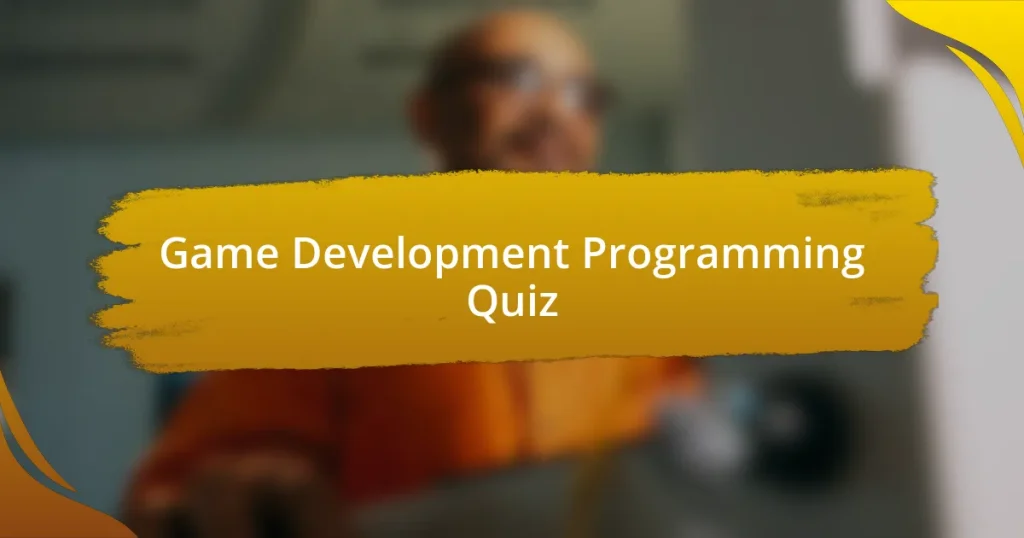
Start of Game Development Programming Quiz
1. What is a game loop?
- A game loop is a random event system that triggers special effects.
- A game loop is the core cycle that constantly executes to update and render the game.
- A game loop is a graphical interface for players in a game.
- A game loop is a sequence that only handles audio in a game.
2. What are the phases of a game loop?
- Input Handling, Update, Physics Simulation, Rendering, Audio Processing
- Scene Rendering, Character Design, Game Testing
- Game Initialization, Player Input, Level Design
- Environment Setup, Asset Management, Sound Mixing
3. What is Input Handling in a game loop?
- Input Handling generates game graphics and animations for the player.
- Input Handling processes player input such as keyboard presses, mouse clicks, or controller actions.
- Input Handling calculates the score based on player actions in the game.
- Input Handling manages the audio and sound effects within the game.
4. What is Update in a game loop?
- Update calculates the score and displays it on the user interface.
- Update updates the game`s state based on input and elapsed time, including character movement, enemy behavior, and environmental changes.
- Update changes the game`s graphics without affecting gameplay elements like AI.
- Update manages sound effects and background music of the game.
5. What is Physics Simulation in a game loop?
- Physics Simulation determines character dialogues and story progression.
- Physics Simulation is solely responsible for rendering visual effects in the game.
- Physics Simulation calculates and applies physics laws to objects in the game world, like gravity, collisions, and motion.
- Physics Simulation handles player input and game commands.
6. What is Rendering in a game loop?
- Rendering creates the game`s audio and sound effects for players.
- Rendering draws the game`s visuals onto the screen, including characters, environments, and effects.
- Rendering compiles the game`s code into a final executable version.
- Rendering calculates the score and game statistics during gameplay.
7. What is Audio Processing in a game loop?
- Audio Processing focuses entirely on visual elements like graphics and animations.
- Audio Processing deals with networking and online multiplayer features in games.
- Audio Processing is responsible for managing user input and interactions within the game.
- Audio Processing handles audio elements in the game, such as sound effects and music.
8. Which programming languages are commonly used in game development?
- CSS
- HTML
- C++
- SQL
9. What is C++ commonly used for in game development?
- C++ is widely used in AAA game development for its performance and control over system resources.
- C++ is primarily used for mobile game development for its simplicity.
- C++ is best suited for web game development for its compatibility.
- C++ is only utilized for creating casual games due to its lightweight nature.
10. What is C# commonly used for in game development?
- C# is widely used for creating operating systems and servers.
- C# is mainly used for scientific computing and numerical analysis.
- C# is commonly used with the Unity game engine for its ease of use and object-oriented features.
- C# is primarily used for web development and scripting web pages.
11. What is Java commonly used for in game development?
- Web browser scripting
- Desktop animation software
- Android game development
- Console graphics programming
12. What is Python commonly used for in game development?
- Designing advanced physics systems
- Developing complex AAA games
- Creating simple games and prototypes
- Programming graphics engines
13. What is Lua commonly used for in game development?
- Network programming
- Graphics rendering
- Sound effects creation
- Game logic scripting
14. What are arrays in game development?
- Arrays are visual representations of game characters in 3D space.
- Arrays are algorithms used to optimize game performance and graphics.
- Arrays are ordered collections of elements, useful for storing lists of objects or game data.
- Arrays are dynamic structures that change size based on user input.
15. What are lists in game development?
- Lists are fixed-size collections that cannot be changed once created.
- Lists are used exclusively for storing 3D models in a game.
- Lists are tables used to manage game settings only.
- Lists are similar to arrays but allow dynamic resizing, making them suitable for storing variable-sized collections.
16. What are dictionaries/maps in game development?
- Dictionaries/maps are key-value pairs that allow efficient data lookup using keys.
- Dictionaries/maps define player character stats in the game.
- Dictionaries/maps store graphical assets like images and sounds.
- Dictionaries/maps are used for rendering game environments in 3D.
17. What are pathfinding algorithms in game development?
- Pathfinding algorithms generate random game levels automatically during gameplay.
- Pathfinding algorithms determine the shortest or most efficient path between two points in a game world.
- Pathfinding algorithms are used to animate characters` facial expressions in cutscenes.
- Pathfinding algorithms calculate the best sound effects for game scenarios.
18. What are collision detection algorithms in game development?
- Collision resolution algorithms determine the actions to take after a collision occurs.
- Collision avoidance algorithms prevent two objects from coming too close to each other.
- Collision detection algorithms detect when two objects in the game world collide with each other.
- Collision recognition algorithms identify the speed of objects during a collision.
19. What are sorting algorithms in game development?
- Sorting algorithms arrange data in a specific order, such as sorting enemy lists by distance or sorting items in an inventory. Examples include Bubble Sort and Quick Sort.
- Collision detection algorithms detect when two objects in the game world collide with each other. Examples include Bounding Box and Raycasting.
- Search algorithms find specific data within a collection or to search for a solution to a problem. Examples include Linear Search and Binary Search.
- Pathfinding algorithms determine the shortest or most efficient path between two points in a game world. Examples include A* search and Dijkstra`s algorithm.
20. What are search algorithms in game development?
- Search algorithms find specific data within a collection or to search for a solution to a problem.
- Search algorithms are used strictly for sound effect processing in games.
- Search algorithms create random levels and environments in a game.
- Search algorithms generate graphics and animations for the game.
21. What are artificial intelligence (AI) algorithms in game development?
- AI algorithms randomly generate game levels without logic.
- AI algorithms create realistic and intelligent behaviors for game characters and enemies.
- AI algorithms only store player scores and statistics.
- AI algorithms exclusively render graphics in a game.
22. What is object-oriented programming (OOP) in game development?
- OOP is mainly used for level design and environmental textures.
- OOP is a method for organizing audio files in a game.
- OOP focuses solely on creating 2D graphics without any object-based structure.
- OOP organizes the game into objects, like characters or obstacles, each with their own properties and behaviors.
23. What is a variable in game development?
- A variable is like a storage box that holds information about the game, such as the player`s score or health.
- A variable is a game engine used to run levels and graphics.
- A variable is a control mechanism for managing game physics and interactions.
- A variable is a concept related to 3D modeling that creates environments.
24. How do you define a variable in C#?
- You define a variable in C# using the syntax `int variableName = value;`, for example, `int playerLives = 3;`.
- You define a variable in C# by writing `let variableName = value;`.
- You define a variable in C# with the command `var variableName => value;`.
- You define a variable in C# using `define variableName = value;`.
25. What is a control structure in game development?
- Control structures, like if-else statements, decide what happens based on conditions in the game.
- Control structures are purely graphic elements used in games.
- Control structures refer exclusively to sound processing in games.
- Control structures are tools used for 3D modeling in games.
26. How do you use an if-else statement in C#?
- You use an if-else statement in C# by creating loops to repeat actions based on conditions.
- You use an if-else statement in C# with a switch-case syntax for alternatives.
- You use an if-else statement in C# like this: `if (condition) { action; } else { alternative action; }`.
- You use an if-else statement in C# by declaring functions to handle conditions.
27. What is a function in game development?
- A function is an element of a game`s soundtrack that enhances the player`s experience.
- A function is a type of game character that interacts with the player in various ways.
- A function is a block of code that performs a specific task, keeping your code organized and preventing repetition.
- A variable is a tool that creates graphics for a game and keeps track of score.
28. How do you define a function in C#?
- You initialize a function in C# by writing `new functionName() { code; }`.
- You define a function in C# using the syntax `void functionName() { code; }`.
- You declare a function in C# with `function functionName() { code; }`.
- You create a function in C# using an array syntax `[]` for declaration.
29. What is OOP used for in game development?
- OOP is used to manage network connections for multiplayer games.
- OOP is used to organize the game into objects, like characters or obstacles.
- OOP is used to render graphics and sounds in real-time.
- OOP is used to create random number generators for games.
30. How do you define a class in C#?
- new ClassName { properties and methods; }
- class ClassName { functions and definitions; }
- public class ClassName { properties and methods; }
- define class ClassName { variables and routines; }

Quiz Successfully Completed!
Congratulations on completing the quiz on Game Development Programming! You’ve taken a significant step in enhancing your understanding of game design and coding practices. Throughout the questions, you likely discovered new concepts and reinforced existing knowledge about programming languages, game mechanics, and development tools. Each question was designed to challenge you and provide insight into this exciting field.
Game development requires a unique combination of creativity and technical skills. From learning about the importance of coding in gameplay mechanics to understanding the platforms used in the industry, you’ve gained valuable insights. This quiz not only tested your knowledge but also highlighted key areas where you can dive deeper. Understanding these components is crucial for anyone interested in pursuing a career in game development.
Now that you’ve completed this quiz, we invite you to explore more about Game Development Programming in the next section on this page. This resource is filled with information that can further enhance your understanding and skills in game development. Whether you’re a beginner or an experienced programmer, you’ll find valuable content to expand your knowledge. Happy learning!

Game Development Programming
Introduction to Game Development Programming
Game development programming refers to the process of writing code for video games. This discipline combines computer science, software engineering, and artistry. Developers create the game logic, control characters, and manage physics. They typically use programming languages such as C++, C#, and Python. These languages allow for developing interactive and engaging game experiences. Essential tools include game engines like Unity and Unreal Engine, which streamline the development process.
Core Programming Languages in Game Development
The most commonly used programming languages in game development are C++, C#, and JavaScript. C++ is favored for its performance and control over system resources. C# is often used with Unity, offering a simpler syntax and rapid development capabilities. JavaScript is widely used in web-based games. Understanding these languages is crucial for writing efficient and functional game code. Each language has its strengths, suited to different aspects of game development.
Game Engines and Their Role in Programming
Game engines are software platforms that facilitate game development. They provide tools for rendering graphics, handling physics, and managing audio. Popular engines include Unity, Unreal Engine, and Godot. Each engine has its programming approach. Unity employs C# for scripting, while Unreal uses C++ and Blueprints for visual scripting. Using a game engine accelerates the coding process and enables developers to focus on game design rather than low-level coding details.
Game Development Frameworks and Libraries
Frameworks and libraries simplify game programming by providing pre-built functions and tools. Examples include Phaser for 2D games and Three.js for 3D graphics in JavaScript. These resources streamline game creation by handling common tasks. They enhance productivity, allowing developers to focus on unique game elements. Using libraries reduces the burden of coding basic functionality from scratch, resulting in faster development cycles.
Best Practices in Game Development Programming
Adhering to best practices is essential in game development programming. This includes writing clean, maintainable code and documenting it thoroughly. Utilizing version control systems like Git is critical for managing changes. Implementing design patterns improves code organization and reusability. Regularly optimizing code for performance ensures smooth gameplay. Following these practices enhances collaboration among team members and leads to a more polished final product.
What is Game Development Programming?
Game development programming is the process of writing code to create video games. This involves using programming languages like C++, C#, or Python to develop game mechanics, graphics, and user interfaces. Developers work with game engines such as Unity or Unreal Engine to streamline the creation process, allowing for complex gameplay and immersive experiences.
How does Game Development Programming work?
Game development programming works by combining algorithm design with coding skills to implement game logic. Developers start with a concept and translate it into a playable game through writing scripts for in-game actions, controls, and physics. Collaboration among designers, artists, and programmers is essential, as they use tools and frameworks to integrate elements seamlessly. Testing and debugging ensure functionality and stability.
Where can I learn Game Development Programming?
You can learn game development programming through various online platforms and institutions. Websites like Coursera, Udemy, and Khan Academy offer courses on game design and programming. Additionally, many universities provide degree programs in computer science or game design. Community forums and game development workshops also serve as practical learning resources.
When did Game Development Programming become popular?
Game development programming became popular in the late 1970s and early 1980s with the rise of home consoles like Atari. As technology advanced, personal computers became powerful enough to support complex games. The growth of the internet in the 1990s further boosted popularity, leading to independent game development and a diverse gaming culture.
Who are key figures in Game Development Programming?
Key figures in game development programming include Shigeru Miyamoto, known for creating iconic franchises like Mario and Zelda, and John Carmack, a co-founder of id Software, who pioneered 3D graphics in gaming. Additionally, Tim Sweeney, founder of Epic Games, has made significant contributions to game engines with Unreal Engine. Their innovations have shaped the industry and inspired countless developers.
















